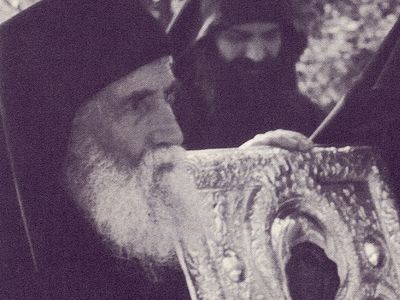 Photo: Artembolnica2.ru
Photo: Artembolnica2.ru
In 2015 I was diagnosed with cancer. Two months later I underwent an operation: with God’s help everything went well. My family prayed for me while a doctor removed my thyroid gland for four hours.
I should have been happy that the cancer had been detected accidentally at a very early stage, that an examination had been made quickly and an operation had been successful. As the hospital doctor joked just before the operation: “In a few hours your thyroid gland will become history.” But sometimes it happens that after cancer is overcome, a person plunges if not into depression, then into sadness and melancholy. He begins to pity himself, and indeed it’s not easy to live without your organ. For the rest of your life, you are dependent on hormone pills (this is called replacement therapy). Once a year you take blood tests for the thyroid hormone, periodically the dose of the drug is increased or decreased, your weight is unstable, and you put on weight very easily. I pitied myself terribly. I can’t say that I didn’t want to live, but I couldn’t feel joy at all. It was painful for my loved ones to look at me; they had no idea to make me laugh. I even started  “If Laymen do not murmur they will receive the same reward from God as ascetic monks.”If those who are poor, in need and are starving do not grumble or murmur, they will receive the same reward as hermits who struggle in asceticism on the slopes of Mt. Athos.
“If Laymen do not murmur they will receive the same reward from God as ascetic monks.”If those who are poor, in need and are starving do not grumble or murmur, they will receive the same reward as hermits who struggle in asceticism on the slopes of Mt. Athos.
“>murmuring against God and the whole world. “Why should I bear such a heavy  The Cross is the Sign of the Savior’s Love for UsThe remembrance of Christ’s Cross, our bowing down before it and venerating it, are for the Christian the greatest consolation in all sorrows and tribulations, and it especially protect him from evil spirits on all the paths of his moral life.”>cross? What did I do to deserve this?”
The Cross is the Sign of the Savior’s Love for UsThe remembrance of Christ’s Cross, our bowing down before it and venerating it, are for the Christian the greatest consolation in all sorrows and tribulations, and it especially protect him from evil spirits on all the paths of his moral life.”>cross? What did I do to deserve this?”
I worked at the Russian Embassy in the United States at the time. I attended St. John the Baptist’s Orthodox Church where I met an amazing girl. This story—sad yet edifying—made me stop feeling depressed, look at my life from a different perspective and try to be grateful to God. It taught me to rejoice in life and strengthened my faith. Knowing the story of that young parishioner, I realize how lukewarm I was, and that I did not know how to thank the Lord, value my relatives, and greet every day with prayer. I would like to share this story with readers.
The girl Julia courageously and bravely struggled with cancer. She believed in her strength and a miracle to the last, took Communion until her death, always smiled and was always in a good mood. She was only thirteen years old. But over such a short time she managed to live a fulfilling, interesting life and cheer people up with her versatile talents. From the age of three Julia studied singing; she sang the Liturgy by heart from an early age, won competitions, and performed solo with a symphony orchestra. This is not to mention folk dances and ballet. And everything was at a very high level…
One day all the parishioners were given color printouts to read: “Julia needs treatment and an operation. She has a rare type of oncology—bone cancer.” There was a photo of a girl with big, beautiful eyes, so radiant and deep that the lack of hair (due to chemotherapy) did not even spoil the impression. Below was a photo from Julia’s “past” life: now at a concert, now while dancing… Bright and cheerful, buoyant and open.
Everyone who saw Julia marveled at how she coped with illness, never complained about anything, and enjoyed life. She answered all questions that everything was fine and all right. She also shared her plans with others. After her leg amputation everything would heal, she would have a prosthesis and would learn how to live anew and walk again.
Perhaps Yulenka1 had such a gift from God—fearlessness and willpower, which helped her pass into eternity with dignity.
Until her last day she accepted all circumstances with gratitude to the Lord and would even say that with God nothing happens without a reason: “So my illness is needed for something, too.”
When Julia was terminally ill, her brother did not know whether he should go to France alone or not. He was both her brother and friend, so he hesitated, but Julia told him, “You must definitely go! I’ll give you my money.” (Julia always had money; she won contests, performed songs, music or dances, and as a token of gratitude people would give her some money). Another girl could have said out of envy, “No way! Don’t go without me!” and it would probably have been difficult to judge her for this.
With such a terrible diagnosis Julia radiated only positive energy, and never during her illness did anyone hear complaints from her or see resentment or  Psychogenic Depression: The Orthodox ViewIt turns out that the main origin of neurosis is not stress and troubles, but a person’s personality. And this personality is internally upset. Sin, as the root of any evil, brings neurotic disorders with itself.
Psychogenic Depression: The Orthodox ViewIt turns out that the main origin of neurosis is not stress and troubles, but a person’s personality. And this personality is internally upset. Sin, as the root of any evil, brings neurotic disorders with itself.
“>depression. Once she even reproached her mother: “Stop worrying and grieving! Do you think it’s easy for me to restrain tears and not let them out? But I’m coping!”
Julia spent five months at a cancer hospital in Mexico where she underwent alternative treatment and chemotherapy. Should I tell you what a cancer hospital is like? Today you have lunch at the same table with your wardmate, and tomorrow that person is gone… Death, pain and suffering are always present there. But Julia’s ward by no means resembled a “funeral home”: She listened to music there—mostly Russian folk songs; she read books in French, spoke Russian with her mother, English with her father (her father is American), and before going to the Mexican hospital… she learned Spanish! No wonder the local doctors admired such a patient! They asked her parents why the girl was so radiant and what her father and mother were did to make her that way. Her mother explains that wherever Julia appeared, order and beauty reigned. When the girl entered her hospital ward for the first time, she looked at paintings hanging on the walls and said, “Beautiful.” It was important for her (regardless of whether she was ill or not) when everything around was harmonious and cozy.
Yulenka was born and grew up in love. She was an adorable daughter, and probably this is why she shared her love with others.
Julia sang in the church choirs at the Churches of St. Barbara of the Greek Orthodox Church and St. Andrew of the Russian Orthodox Church in the city of St. Petersburg in Florida. She had a silvery voice and almost perfect pitch. She had a funny and artistic character, and her mother could hardly cope with her energy. And add to this her perfectionism! The girl did not do anything “anyhow” or “a little bit”. If she studied singing, she reached great heights, and everyone praised her and said that she was a born singer. If she played the piano, it was the same story. Also with painting. Julia had this approach towards faith too—she prayed and loved her neighbors sincerely.
Julia was homeschooled. She was the top-of-the-class student. However, mathematics was not her favorite subject—it was not her element. History, foreign languages, painting, music and sports—Julia was the first here!
After her leg amputation, Julia received Communion every Sunday. At first she used a wheelchair, and then she walked on crutches. And one day the doctors said that she had two weeks to live! It was just like a shot. Earlier they had wondered whether Julia, a child, should be told the whole truth. Her mother decided that Julia had the right to know everything as it was. But nevertheless, no one had expected such straightforwardness. Julia did not shed a single tear; she sang, continued to do her homework, and played with her beloved Mickey (dog). It’s touching that the teachers checked her homework after Julia’s death, because she had done all of her homework for two or three weeks in advance!
Julia was given her last Communion about three hours before her death. And just before she died, she had said, “I love you all so much! There is no death—we have eternal life!”
Julia was so endearing to people that parishioners and priests constantly came to her hospital, read prayers and gave her unction. After her death, someone wrote a poem dedicated to Julia and hung it at the entrance to the church. Although it’s blank verse and short, it’s very touching: “The princess of peace and purity is as pure as a white snowflake!”